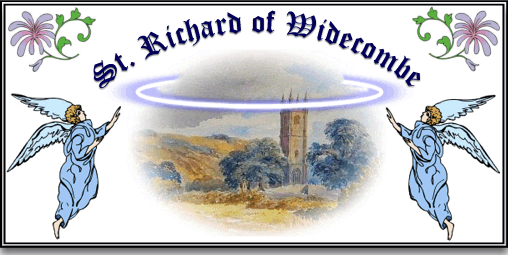
Whilst perusing an old book of 1875 I came across a startling statement which proclaimed that a saint was born at Widecombe-in-the-Moor. This very piece of information could be the start of a new place of pilgrimage for many people wanting to see the saints birthplace. Imagine, instead of selling Tom Cobley fridge magnets the gift shops could be flogging St. Richard relics?
But this story needs a bit of the author’s historical background first. Sometime during the reign of Henry III the lands of Widecombe went into the possession of a family called FitzRalph. This family later became known as Shillingford, a name probably taken from their estate near Exeter. Before they moved to Exeter the family lived at North Hall in the parish of Widecombe. It was whilst here that a son was born who was named Richard and that would have been around the reign of Edward I. Richard must have been a bright boy because in later life he became Chancellor of Balliol College Oxford and even later the Archdeacon of Lychfield. Within the church Richard was surely on a ‘fast-track’ because in AD1346 he was consecrated as the Archbishop of Armagh and Primate of all Ireland. This appointment came directly from Pope Clement VI and the consecration service was held in Exeter cathedral. During his office as Archbishop he was said to have translated the whole bible into the Irish tongue. Tradition has it that he hid a copy of his work inside one of the walls of Armagh cathedral and on the book the following words were inscribed, “When this book shall be found the truth shall be manifested to all the world; or Christ shall soon after appear to the world.” In 1530 the book was discovered when some repairs were being carried out on the cathedral, this was the same year as the announcement of the Reformation of Ireland – prophetic or what?
Then Richard’s career took a downturn when he appears to have got on the wrong side of some Mendicant Friars. It appears the reason for this was that he had criticised (and that’s putting it mildly) some of their practices especially that of begging which resulted in him being banished from the land. To go down the road of his criticisms is to enter a field of heavy Christian debate which reaches as far as the realms of ‘Piers the Ploughman’ who takes up the debate. Richard ended up in Avignon where he died in 1360, his bones was taken back to Dundalk by the Reverend Stephen of Meath where it was interred in the Church of St. Nicholas. However, as always there is some doubt as to what actual bones Reverend Stephen brought back, there are those who said they were not Richard’s. Throughout his time in Ireland Richard was renown for his kind and caring nature and is is particularly remembered for his concern for the plague victims and sufferers of Dundalk.
Richard Fitz Ralph became known as St. Richard of Dundalk and his feast day is on the 27th of June. A local saying among the pilgrims who visited his tomb was, “Many a mile did walk, but never seen so good a man as Richard of Dundalk”, there were even reports of miracles occurring at his tomb. I think the following prayer is said on St. Richard’s saints day?
“Holy and merciful God, you gave Richard Fitz-Ralph not only gifts of piety and learning but also such compassion for those who were suffering and in need that he strove to care for them. Enable the members of your church after his example to seek holiness in life and integrity of intellect with a like concern for the helpless. For the sake of Jesus Christ our Lord.“
So, there you have it, a saint was born on Dartmoor and in which case why is he not the patron saint of Widecombe church? Is this a case of mistaken identity or in other words mistaken FitzRalphs’ or was Saint Richard truely of Dartmoor stock? If so a campaign should be launched to get his bones back to Widecombe where they can rest on his native soil! The only fly in the ointment is that it was Sir Ralph Fitz Richard who owned North Hall not the FitzRalph’s – so Ralph or Richard which one Fitz?
The Actual book where the reference to St. Richard being born near Widecombe was Charles Worthy’s, ‘Ashburton and its Neighbourhood‘, page 61. I add this because most references, especially the Irish ones, claim that Richard FitzRalph was born in Dundalk. So before the Vatican unleash ‘Van Helsing’ on me – don’t shoot the messenger, it’s Charles Worthy you want? And as he shed his mortal coil long ago it’s probably best for them to have a word with their boss who can sort it directly.
 Legendary Dartmoor The many aspects past and present of Dartmoor
Legendary Dartmoor The many aspects past and present of Dartmoor
